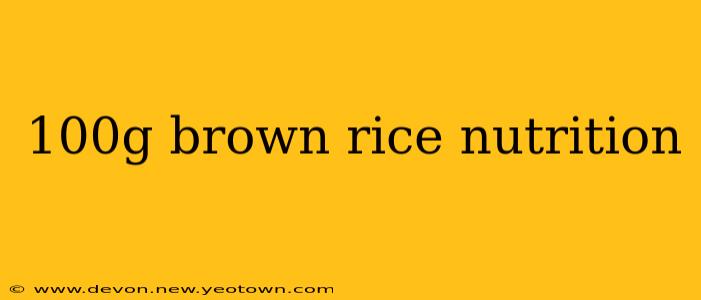Brown rice, a whole grain powerhouse, has steadily climbed the ranks of popular healthy foods. But what exactly makes it so nutritious? Let's delve into the nutritional profile of 100 grams of this versatile grain, exploring its benefits and answering some frequently asked questions.
Our journey begins with a simple question: What are the key nutritional components in 100g of brown rice?
The nutritional breakdown of 100g of cooked brown rice typically includes approximately:
- Calories: Around 111 calories
- Carbohydrates: Approximately 22g, predominantly complex carbohydrates that provide sustained energy.
- Protein: Roughly 2.7g, a moderate source of plant-based protein.
- Fat: About 1g, mostly unsaturated fats beneficial for heart health.
- Fiber: A significant 2.2g, crucial for digestive health and feeling full.
- Manganese: A good source, essential for bone health and metabolism.
- Magnesium: Contributes to healthy blood pressure and muscle function.
- Selenium: An important antioxidant protecting cells from damage.
Beyond these key nutrients, brown rice also offers smaller amounts of other vitamins and minerals like iron, phosphorus, and zinc. The exact amounts can vary depending on factors such as the type of brown rice, growing conditions, and cooking methods.
Is Brown Rice Better Than White Rice?
This is a common question, and the answer is nuanced. What are the differences between brown rice and white rice nutritionally? The key difference lies in the processing. White rice undergoes milling, removing the bran and germ layers. While this process enhances shelf life and improves the texture, it also strips away much of the fiber, vitamins, and minerals. Brown rice, retaining the bran and germ, boasts a significantly higher nutritional profile.
How Many Calories Are in 100g of Brown Rice?
As mentioned earlier, 100g of cooked brown rice contains approximately 111 calories. However, remember that the calorie count can fluctuate depending on the cooking method and whether you're measuring cooked or uncooked rice. Uncooked brown rice will have a higher calorie density per weight due to the lower water content.
Is Brown Rice Good for Weight Loss?
The high fiber content in brown rice is key to its role in weight management. How does brown rice contribute to weight loss? Fiber promotes satiety, meaning you'll feel fuller for longer, potentially reducing overall calorie intake. It also aids in digestion and can help regulate blood sugar levels, preventing energy crashes and cravings. However, like any food, moderation is key. While brown rice can be part of a healthy weight loss diet, it shouldn't be the sole focus.
What are the potential health benefits of eating brown rice?
The nutritional richness of brown rice translates into a range of potential health benefits:
- Improved Digestion: High fiber content supports regular bowel movements and prevents constipation.
- Heart Health: The fiber, magnesium, and unsaturated fats contribute to maintaining healthy cholesterol levels and blood pressure.
- Blood Sugar Control: The complex carbohydrates release glucose slowly, preventing sharp spikes in blood sugar.
- Reduced Risk of Certain Cancers: Some studies suggest a correlation between whole grain consumption and a lower risk of certain cancers.
In conclusion, 100g of brown rice offers a nutritious and satisfying addition to a balanced diet. Its rich nutrient profile, particularly its fiber content, contributes to various health benefits. Remember to always consider it within a broader healthy eating plan for optimal results.

